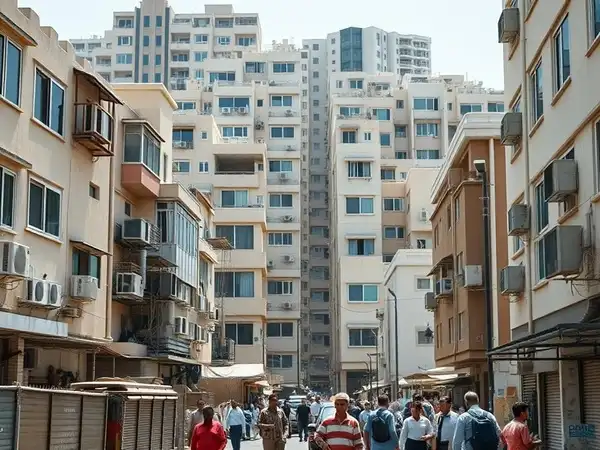By Staff Reporter
Dubai: Recently, Dubai Municipality, alongside the Dubai Land Department and Civil Defense, has launched intensified inspections across key residential hotspots like Deira, Al Riqqa, Satwa, Al Barsha, and Al Raffa. Their target? Illegal partitioned rooms and bed spaces that pose serious safety risks—from fire hazards to blocked emergency exits—in crowded residential buildings.
Partitioned rooms might seem like a quick fix for affordable housing, especially for lower-income residents, but in Dubai, they’re a big no-no without official approval. Authorities are taking a firm stand against these unauthorized modifications, emphasizing that safety cannot be compromised for convenience or cost savings.
Living in partitioned room
Scroll through Facebook ads for just a few minutes, and you’ll find a shadow housing market thriving in plain sight. Partitioned rooms are being rented out for as much as Dh1,400 a month—often just a slice of someone else’s living space, separated by thin walls or curtains.
In Satwa, a loft bed squeezed above a cupboard in a makeshift room can go for Dh600. It’s barely enough space to stand, let alone live. In Deira, partitions can be found for Dh650, sometimes higher if they come “all in”—meaning free Wi-Fi, DEWA, and maybe a balcony shared with several others.
For those chasing affordability, a “fully closed” partition can go as low as Dh800 in some areas, or Dh700 for a single-person slot. The price varies by location and perks, but the bottom line remains: these setups are often cramped, poorly ventilated, and unregulated.
Yet for many low-income workers, these hidden corners of the city are the only option. The question is—how long can this patchwork system go on before safety, dignity, and affordability collide?
But the problem isn’t confined to old Dubai’s jam-packed neighborhoods—it’s creeping into the city’s most upscale corners. Take Dubai Marina’s Jumeirah Beach Residences, for example. A British tenant, living in Dubai since 2008, who requested anonymity, blew the whistle on a four-bedroom apartment in Sadaf illegally converted into a seven-bedroom bunker, crammed with up to 60 people sleeping in bunk beds. Some are renting beds at a bargain Dh100 each, openly advertised on Facebook as a “holiday home” — without a single permit.
This isn’t just rule-breaking; it’s blatant exploitation and a disaster looming on the horizon. With no proper air conditioning, zero privacy, and fire exits blocked by makeshift bedrooms in utility spaces, the risk isn’t hypothetical—it’s a disaster waiting to happen. The consequences could be catastrophic.
As Dubai cracks down on illegal partitions, the conversation around affordable and safe housing for low-income workers is reaching a boiling point. The challenge goes beyond enforcement—it calls for bold, creative solutions that balance dignity, safety, and economic realities.
Some experts suggest government-backed subsidized housing schemes tailored for workers earning less than Dh2,000 a month. Imagine safe, regulated homes within the city that don’t cost a fortune but meet strict safety standards—a real alternative to cramped, unsafe rooms.
Developers could also play a key role – Builders can include affordable, purpose-built accommodations in their projects, creating a long-term fix rather than a quick patch. Meanwhile, flexible shared housing models—legal co-living spaces with privacy and safety—could offer a modern, community-driven solution that respects workers’ needs and budgets.
For those who can’t afford Dubai rents, relocating to more affordable cities on the outskirts is an option—but the long commute poses a significant challenge. Some have proposed transport subsidies or dedicated shuttle services to ease the burden on workers’ time and finances.
As Dubai continues to grow and transform, safe and affordable housing for its workforce is no longer optional—it’s urgent. The crackdown on illegal partitions exposes a deeper crisis that needs real solutions. With smart enforcement, bold innovation, and public awareness, Dubai can build safe, inclusive, dignified homes for everyone who powers the city’s success.
Have you faced the same issue in your building or neighborhood? What did you do? What solutions do you think could ease the pressure on those priced out of legal housing? Let’s open the floor—because fixing this isn’t just about policy, it’s about people.
Source: Gulf News


